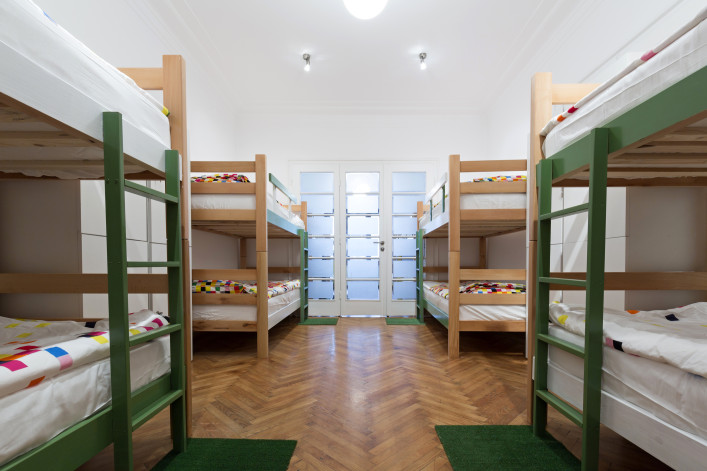The NYC living situation you've probably never heard of: Flight attendant crash pad

iStock
With their wheeled carry-ons and crisp uniforms, flight attendants seem like the picture of perfect efficiency. (We're not talking about the ones who've gone rogue or who give commercial flying a bad name.) As we recently discovered, in this interview with Brick reporter Alyse Whitney, they're pretty efficient in their approach to New York City housing, too. Here's one flight attendant's story, as told to Whitney.
As a flight attendant, I spend at least half the month in the air. My trips take me throughout the continental U.S., and to many different countries every week—I've recently been in Amsterdam, Paris, and London—but I need a place to rest when I’m here in New York City. I currently live in a two-bedroom in Queens with one of my best friends, but before that, I shared a small one-bedroom apartment with two other flight attendants in a Kew Gardens “crash pad.”
People outside of the airline industry aren’t very familiar with crash pads, so the easiest way to explain it is it's like a crowded college dorm. Usually someone who owns an apartment in Kew Gardens—a popular spot for flight attendants since it’s equidistant from JFK and La Guardia—will run a crash pad and rent out beds. Probably nine out of 10 flight attendants and pilots that I know live in a crash pad. More often than not, it’s a few bunk beds per room in a fully furnished apartment, with everyone paying between $200 and $400 per month.
[This article was originally published in May 2017.]
Many flight attendants and pilots commute to New York from other cities and spend this extra money monthly so they don’t have to rent a hotel when they have back-to-back trips. Hotels are only paid for by the airline when you’re on a layover. If you choose to live in another city and commute to a major-city airport—like NYC, Chicago, or Atlanta, for instance—then any overnight accommodations are on you. Most flight attendants get paid by the hour and only get a small per diem (about $2 per hour) when you’re working. For me, that just barely covers food.
Crash pads are technically illegal, kind of like an Airbnb, but I’ve only heard of one crash pad being shut down. Most people pay their landlord month-to-month and are not on a lease, but there is a little more trust since we all were vetted by our companies to work for airlines and crash pads aren’t posted on Craigslist. They're discovered by word of mouth, and there is a screening and interview process to get a place in one. That said, we didn’t all trust each other. Sometimes there are locked bins provided at the crash pad, but most people just take their stuff with them just to be sure no one would steal them while they were gone.
Some people would be at the crash pad one day a month, while others would be there closer to two weeks. It wasn’t a welcoming home. Even though it was fully furnished with a couch, coffee table, kitchen supplies, and a few bunk beds in the bedroom, it wasn’t an environment where people wanted to mingle around in. People rarely cooked, and no one ever decorated. Utilities like electric, gas, and wi-fi were included, but if you wanted to watch TV, you usually just lay in bed with your laptop.
This doesn’t sound so bad, right? Well, just like with a dorm room, there are rules. You're only allowed to live there a maximum number of days per month. It varies, but is typically no more than 14 days lived fully in the apartment, and other crash pad residents will tattle on you if you go over your limit. You cannot have any guests in the apartment at any time, and that includes significant others—or random Tinder hookups.
Of course, these rules aren’t always followed—once I walked into my old crash pad and saw my roommate having sex with a stranger on our couch. That she didn’t even chip in for. I just walked briskly to the bedroom and shut the door. Another time, a roommate spilled milk by the fridge before leaving for a trip and let it sit there instead of cleaning it up. I came home to the smell of rotten milk and had to clean it myself. I didn’t have the most courteous roommates, which made it a tough place to live.
Somehow, all of us also had very similar schedules, so I was never alone in the apartment. Since we all shared a bedroom, if someone listened to music, watched TV, or snored—and my male roommate definitely did—we’d all hear it. If one of us was on call, the airline could call us in the middle of the night to report to the airport. We’d all hear that phone go off and wake up in a panic, or hear a 3 a.m. alarm go off because someone had to be at the airport at 5 a.m. Noise-canceling headphones helped, but they’re not ideal to sleep with every night.
The apartment was so small you could hear someone on the phone in the other room like they were right next to you, so moving to the living room didn’t help. Plus, my one roommate would often hog the couch to play video games for 16 hours straight. But then again, once I caught my roommate having sex on the living room couch, it made me spend less time lounging on it ...
Even though it wasn’t a dream first NYC apartment situation, I was kind of used to it since I got the job right out of college and was used to sharing a room. But I also knew it wasn’t permanent and decided that saving money would be my priority. By living in a crash pad, I was able to put half of my paycheck into savings. I saved $16,000 in a year, and that’s how I could afford to move out. Ultimately, I liked the convenience to the airport and saving money, but nothing else.
After a year of saving, I moved out of the crash pad because of the lack of privacy, for one, but also because I was surrounded by work 24/7. It was impossible to have a social life when I couldn’t have people over, and difficult to meet new people because I felt I was stranded far out in Kew Gardens. (There are other crash pad locations throughout Queens, but most of them are in Kew Gardens.) I first moved to the Upper West Side for a little over a year, but ended up in Astoria after a mouse infestation.
Now that I don’t live in a crash pad, I miss the free shuttle that brought me to both airports in 20 minutes flat. But I don’t miss sleeping in a room with two other people. Now I have my own bedroom and closet, I can grocery shop and cook—something that was rare in the crash pad—and have people over. And hey, the public transit isn’t bad to either airport, and an Uber Pool to LGA is only $7! The only time I’ll voluntarily share a room with two other people is if I’m enjoying a cheap vacation overseas and staying in a hostel. But then at least my roommates won’t be flight attendants with 4 a.m. wake-up calls.
You Might Also Like
























